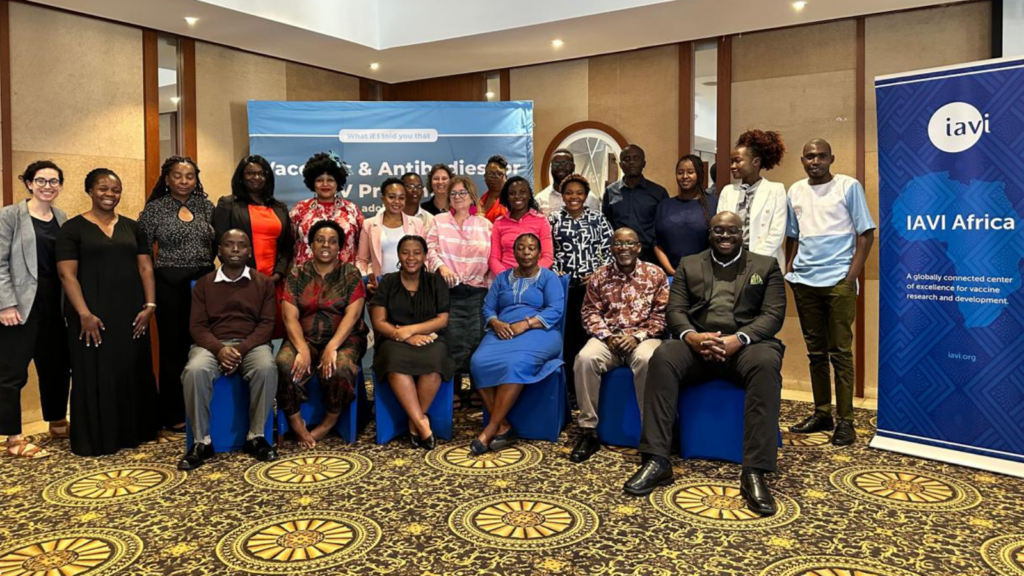June 24, 2024
Advocates push for local manufacturing to achieve health equity in Africa
Research literacy learning collaborative led by CASPR brings together health advocates in Africa, linking the science of vaccine development to vaccine advocacy.

Often, Africa is seen through the lens of a polycrisis where health is concerned. Yet, despite a heavy disease burden compounded by climate change effects and other socioeconomic challenges, Africa’s Agenda 2063 for prosperity emphasizes health as a key factor for success. To achieve Africa’s vision of leadership in research and development (R&D), pandemic preparedness, and global health security, we must address significant gaps in prioritization, capacity, and funding of research and local vaccines and essential medicines production.
As part of ongoing efforts to strengthen advocacy toward building robust and sustainable health systems in Africa, IAVI, the Advocacy for Prevention of HIV and AIDS (APHA) and AVAC are partnering to enhance research literacy among health research advocates. Through the Coalition to Accelerate & Support Prevention Research (CASPR), this effort is strengthening the capacity of advocates to understand, critically appraise, and use information related to prevention research in a rapidly evolving field. In the face of the continuing HIV epidemic, which remains a significant burden to Africa’s health and well-being, the CASPR coalition has focused on advocacy to accelerate research that will yield more biomedical HIV prevention options.
In marking this year’s HIV Vaccine Awareness Day (HVAD), this initiative brought together 20 health advocates from Kenya, Uganda, South Africa, Zambia, and Zimbabwe in a workshop that helped them link the science of vaccine development to vaccine advocacy. The two-day workshop, held May 21-22, provided participants with insights into how vaccines work, different vaccine development platforms, the HIV vaccine pipeline, funding strategies, and other prevention approaches like broadly neutralizing antibodies. Interactive sessions and practical exercises were employed to strengthen participants’ knowledge and capacity to advocate for various vaccine R&D themes, shaping the future of HIV prevention efforts in Africa.
A significant outcome of the HVAD Vaccine Research Literacy Workshop was the commitment by the advocates to push for local manufacturing as a pathway to improved health outcomes and economic benefits. Local manufacturing is essential in ensuring the affordability and accessibility of medicines. Over 70% of Africa’s public health commodities for the three leading infectious diseases — HIV, tuberculosis, and malaria — are procured from outside the continent. This pattern of vaccine dependency extends to other disease areas. Severe supply chain disruptions to health commodities during the COVID-19 pandemic highlighted the challenge of such over-reliance on imports and exposed the continent’s inequitable access to lifesaving medical products.
Several challenges continue to limit local manufacturing of health commodities in Africa including high labor costs, scarcity of expertise, high taxes on imported raw materials, unfavorable foreign currency policies, weak regulatory frameworks, disharmonized registration procedures across countries, and lack of assurance of regional and international markets. This places Africa in a continued position of reliance on other regions for medical supplies.
Addressing these challenges can lead to improved health outcomes, economic benefits, and the discovery and development of new tools and commodities. To achieve scalable and equitable access to health commodities, African governments must support local innovation and work closely with all sectors. The first step would be shifting the narrative from seeing the region as dependent, to recognizing Africa’s resource richness. Effective regulatory frameworks and increased community trust could contribute to ready markets for locally produced vaccines and therapeutics. Efficient and accountable use of available funding and mobilizing domestic resources to reduce reliance on external donations would provide much-needed support to African researchers and the innovation of sustainable health initiatives. Encouraging knowledge sharing, collaboration among countries, and policies that support local manufacturing can greatly boost the region’s collective capabilities. Together, these measures will contribute to building a resilient and self-sustaining health landscape across the continent. The commitment by advocates at the recent HVAD Vaccine Research Literacy Workshop is timely, as continued advocacy for sustained investments in local manufacturing is central to realizing Africa’s health agenda. This research literacy initiative is guided by findings from a needs assessment undertaken by IAVI and APHA on the knowledge and research literacy needs in the context of HIV biomedical prevention research among advocates in the CASPR coalition in 2022, and will continue in subsequent years. Working with a core group — the research literacy learning collaborative led by CASPR — the initiative established a cohort of advocates to engage in research literacy over a given period alongside the coalition. The cohort of advocates is drawn from countries impacted by HIV vaccine and biomedical prevention research, and in which CASPR advocates are present. Through this and similar collaborative efforts and advocacy, the vision of Africa researching and producing health commodities can become a reality.